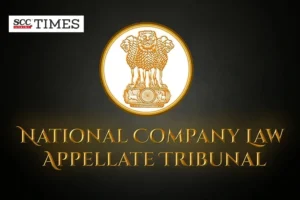National Company Law Appellate Tribunal, Chennai: In an appeal against the NCLAT’s order regarding issue of contribution to liquidation costs, a division bench comprising of M. Venugopal,* J., and Mr. Ajai Das Mehrotra, (Technical Member), affirmed the appellant’s classification as a Financial Institution and its liability to pay liquidation costs. The NCLAT stressed on the importance of procedural compliance, particularly regarding the submission of certified copies of orders.
Factual Matrix
In the instant matter, the appellant being dissatisfied with the impugned order dated 25-05-2023, addressing the issue of contribution to liquidation costs by various parties, including the appellant and other respondents, passed by the Adjudicating Authority preferred an appeal challenging the same. The appellant seeks the setting aside of the impugned order based on the argument that the appellant is not liable to contribute to liquidation costs.
Moot Point
Whether the appellant, acting as an Investment Manager for Debenture Holders, liable to contribute to liquidation costs as ordered by the Adjudicating Authority?
Parties’ Contentions
The appellant contested its liability to contribute to liquidation costs and argued that the appellant represents Debenture Holders who are not financial institutions, hence not subject to such obligations. It was asserted that neither the appellant nor the Debenture Holders fall under the definition of financial institutions, as per relevant statutes. The appellant contended that its primary role is managing funds and investing in secured debentures, which do not qualify them as financial institutions. The appellant argued that the Liquidator failed to cooperate with secured creditors and neglected their duty to maximize asset value during liquidation. Furthermore, the appellant argued that the impugned order was non-speaking and unreasonable.
The respondent 1-Liquidator argued that the impugned order adhered to the Insolvency and Bankruptcy Code, 2016 (IBC) and liquidation regulations. It was contended that the appellant falls under the category of a financial institution and should contribute to liquidation costs. The respondent cited regulations mandating secured creditors to pay liquidation costs and emphasised the need for compliance. They criticised the appellant for not applying for a certified copy of the impugned order before filing the appeal.
Key Legal Principles
-
A reasoned order enhances the appearance of justice.
-
The obligation to apply for a certified copy of an order lies with the aggrieved party, and failure to do so cannot invoke exclusion of time under the Limitation Act.
-
The filing of a certified copy of the impugned order is mandatory in appeals before the NCLAT, unless exempted by the Tribunal.
NCLAT’s Observation
The NCLAT noted that the Adjudicating Authority observed various communications indicating the Appellant’s involvement and obligations, including emails regarding the relinquishment of security interest and payment of liquidation process costs. While dismissing the appellant’s argument of the impugned order being non-speaking or unreasoned, the NCLAT emphasised that reasons are crucial in orders and stated that speaking order forms the essence of justice. The NCLAT held that the impugned order was reasoned, speaking and valid, as it addressed the main contention raised by the appellant and provided a basis for its decision. The NCLAT emphasised the importance of timely filing and the requirement of a certified copy of the impugned order with the appeal and held that “the filing of a ‘Certified Copy’ (Paid Cost Copy), is not an empty ritualistic formality”. The NCLAT further noted that since the appellant did not apply for the certified copy of the impugned order, “the invocation of Section 12 of the Limitation Act, 1963, which specifies that time requisite for obtaining the copy of the order, appealed shall be excluded,” does not arise on any score.
The NCLAT asserted that when a Secured Creditor exercises its right as per Section 52 of the IBC, there is no provision in the IBC or Regulation, which provides for extension of time, to pay the Liquidation Costs. The Court noted that “Regulation 21A of the Liquidation Process Regulations, 2016, that the `Secured Creditors’, who do not relinquish their `Security Interest’, in the `Liquidation Estate’ is required to pay the Sum as payable under clause (a) and sub-clause (i) of clause (b) of subsection (1) of Section 53 of the Code, which includes the `Appellant’.” The NCLAT determined that the Appellant, through its investments, falls under the definition of a Financial Institution and held that the appellant, being a Financial Creditor, is liable to pay liquidation process costs as per the IBC and the Liquidation Process Regulations, 2016.
NCLAT’s Decision
The NCLAT upheld the impugned order, affirming the appellant’s classification as a Financial Institution and its liability to pay liquidation process costs. The appeal was dismissed, with no costs awarded.
[Essel Finance Advisors & Managers LLP v. Pankaj Srivastava, 2024 SCC OnLine NCLAT 343, order dated 15-03-2024]
*Judgment by Justice M. Venugopal
Advocates who appeared in this case :
Mr. V.V. Sivakumar and Mr. SR. Tejas, Counsel for the Appellant
Mr. Abhishek Anand, Counsel for the Respondent No. 1

